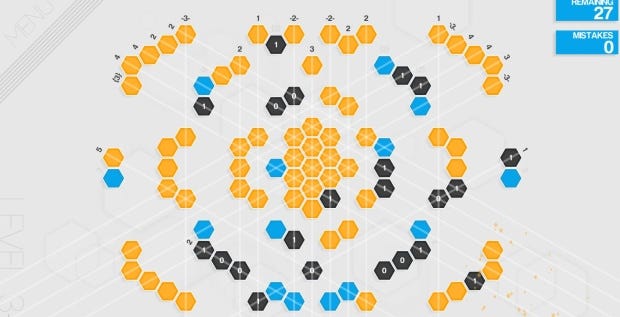Hexcells Infinite: Wot I Think
Hexy And It Knows It
I wasn’t subtle about how much I enjoyed Hexcells last year. The original Hexcells appeared from nowhere in my inbox in September, and I fell instantly in love. The second game, Hexcells Plus, arrived in December, after we’d already decided the original deserved a spot in our top games of 2013. I’ve replayed both games multiple times, because it’s a puzzle game of exquisite pleasure, delivered with calm poise and utter beauty. I was primed to think I might quite like Hexcells Infinite. Here’s wot I think:
Of course I like Hexcells Infinite. It’s utterly wonderful. It’s sublime, in fact. The ambient air, the utter magic of quick solving literally making music, while quiet, steady solving feels like massive victory after victory, and the sense of artistry behind the crafting of the puzzles, puts this a level above. This third and final (sniff) instalment is by far the hardest so far, another 36 puzzles that quickly reintroduce all the concepts from the first two games, and force you to think harder that ever.
Hexcells offers that ideal position of apparent simplicity, but a depth of complexity. You have to either colour a hexagon blue, or delete it. That’s it. The rules by which you know how to do this at first feel reminiscent of Minesweeper, but it quickly becomes apparent how poor a comparison this is. This isn’t random hope - it’s precision calculation. Each puzzle requiring you to take in all the available information, and then make leaps of logic in order to apply them. What were once relatively simple but engaging puzzles in the original game are now hour-long studies, where you become certain there’s a mistake, that there’s no possible move left to discern, maybe walk away for a while, and then come back to realise it, and feel like you changed the world.
One of the key things about playing Hexcells is how brilliant it makes you feel about yourself to find a next move. It’s hard to resist calling other people into the room and point at the screen, explaining just how clever you have to have been to have known that hexagon should be blue. You should resist that though – people won’t understand. But I understand. I will always understand.
Once again the game has an ambient mix of music in the background, into which your clicks add tones. I was slightly annoyed by a delay being added to Plus to allow this to become more musical, but I’ve been totally won over by the idea this time around. It’s ridiculous how calming the atmosphere becomes, countering a desire to tear your hair out at not spotting your next move.
And with infinite, creator Matthew Brown frees himself of obligation to keep making more puzzles with the creation of a random puzzle generator. Put in an 8 digit string, and it’ll create a puzzle unique to that number. It has an option to randomly pick a number, or lets you use today’s date to offer a notion of a daily challenge. Or you could go loopy and just start at 00000001 and work your way up.
Of course these randomly generated puzzles do not equal the hundred or so Brown has hand-made – it’s immediately a different experience, the sense of craft removed. They tend to be more sprawling, less refined. But I still find them a giant heap of fun to play. In fact, after staring in utter bemusement at the final six puzzles in the main game for many hours, having a large-but-easier version of the game is a very pleasant alternative.
With the ability to share the code for a particularly good auto-generated puzzle, it seems like a community will soon collate the best numbers to paste in, creating unofficial extra “packs” for the game. It’d be lovely to see an option for something like that built into the game – a way to favourite a strong puzzle, to build your own mini-collections to share with others. For the moment, it’s pasting them into a Notepad, I guess.
A couple of frustrations from the previous games are fixed, too. No longer are the game level numbers weirdly different in the menu screen and in-puzzle. And the option for switching the mouse buttons over (as all good people will) is now nice and clear, and flagged up as an option when you start. There’s still no clear presentation of which puzzles you’ve finished without making mistakes, however, which is a bit of a shame. Just having a puzzle group turn gold when you’ve perfected it would add a lot for
puzzle-perfectionists like me – as it is, it’s not possible to even tell which puzzles you’ve so far fallen short on.
It remains very cheap – just $5 for enough puzzles to keep you busy for many, many hours, and indeed an infinite number more to keep you busy for the rest of time.
And it’s just a ludicrous pleasure to play. Brown is clearly a very smart chap, and as you play through the puzzles here you’ll notice how he’s obviously been setting himself challenges in the designs. Puzzles are fitted into particular patterns, or made remarkably small while remaining deeply complex, as if he’s trying to find ways to push himself in their design. It pays off, especially if this is your third time sitting down with the concept.
Despite the infinite mode, it’s a massive bummer that this’ll be it for Hexcells challenges crafted by Brown. But it goes out in particular style.
Hexcells Infinite is out now on Steam, for £5, with a bundle of all three games for just $9. You can also buy the game directly from its developer.



